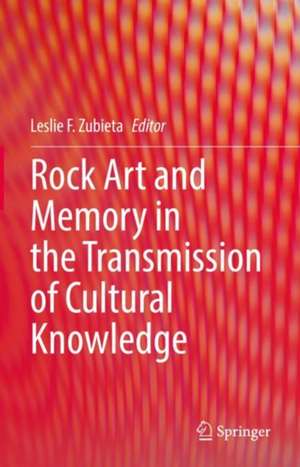Rock Art and Memory in the Transmission of Cultural Knowledge
Editat de Leslie F. Zubietaen Limba Engleză Hardback – 8 iul 2022
| Toate formatele și edițiile | Preț | Express |
|---|---|---|
| Paperback (1) | 633.81 lei 38-44 zile | |
| Springer International Publishing – 9 iul 2023 | 633.81 lei 38-44 zile | |
| Hardback (1) | 595.78 lei 38-44 zile | |
| Springer International Publishing – 8 iul 2022 | 595.78 lei 38-44 zile |
Preț: 595.78 lei
Preț vechi: 783.92 lei
-24% Nou
Puncte Express: 894
Preț estimativ în valută:
114.00€ • 124.22$ • 96.06£
114.00€ • 124.22$ • 96.06£
Carte tipărită la comandă
Livrare economică 19-25 aprilie
Preluare comenzi: 021 569.72.76
Specificații
ISBN-13: 9783030969417
ISBN-10: 303096941X
Pagini: 298
Ilustrații: XXIV, 298 p. 202 illus., 85 illus. in color.
Dimensiuni: 155 x 235 mm
Greutate: 0.64 kg
Ediția:1st ed. 2022
Editura: Springer International Publishing
Colecția Springer
Locul publicării:Cham, Switzerland
ISBN-10: 303096941X
Pagini: 298
Ilustrații: XXIV, 298 p. 202 illus., 85 illus. in color.
Dimensiuni: 155 x 235 mm
Greutate: 0.64 kg
Ediția:1st ed. 2022
Editura: Springer International Publishing
Colecția Springer
Locul publicării:Cham, Switzerland
Cuprins
Preface.- Part 1. Theoretical Debates.- Chapter 1. Memories in the Making. Rock Art, Ecology and Differentiation.- Chapter 2. Memories and Rock Art in the Southern Andes: "This was left to us by the Incas".- Chapter 3. Culture, Memory and Rock Art.- Chapter 4. Creation Processes Behind Rock Art: The Role of Memorization in Passing on Cultural Knowledge.- Part 2. The Memory of Rock Art in Non-Direct Ethnographic Contexts.- Chapter 5. Geographies of the Invisible: Rock Art, Memory and Ancestral Topologies in Western Iberia.- Chapter 6. Most Deserve to be Forgotten – Could the Southern Scandinavian Rock Art Memorialize Heroes?.- Chapter 7. Memories and Materiality. The Construction of Social Memory in Cerro Colorado.- Chapter 8. The Role of Rock Art in the Prevalence of Memory and Cultural Transmission.- Chapter 9. The Memory of Rock Art, Ethnography and Community Participation.- Chapter 10. River, Stone, and 'The Rain's Magic Power': Rock Art and Re-Membering in the Northern Cape, SouthAfrica.- Chapter 11. Padeo Masirĕ – Elements of the Culture of Respect among Humans, Nonhumans and Ʉtã Woritire (Petroglyph Sites) through a Tuyuka Perspective.- Chapter 12. Handprints, Footprints, and Hairwhorls: The Intersection of Petroglyphs, Cultural Identity, and Collective Memory in the American Southwest.- Index.
Notă biografică
Dr Zubieta will precede the proposed edited book. Her general aim for this book is to address contemporary debates and discussion around how the intersection of rock art and memory can advance our knowledge of rock art research and interpretation. Her interest in this topic has been nurtured from her contact with indigenous peoples and colleagues throughout her academic positions (see CV). In particular, her work on rock art as a mnemonic device in girls' initiation rock art in south-central Africa (Zubieta, 2006, 2016) has been the primary influence in her career to pursue this line of research. Leslie graduated in archaeology with distinction in the National School of Anthropology and History (Escuela Nacional de Antropología e Historia, ENAH) in Mexico City (2002). She obtained an MSc (2004) and PhD in rock art studies in the University of Witwatersrand in South Africa (2009). Leslie has enjoyed research stays in Austin (United States), Paris, Périgueux and Toulouse (France). Throughout her professional career she has participated in various projects in Australia, Malawi, Mexico, Mozambique and Zambia. Her research focuses on rock art, cultural material, gender and memory. One of her main contributions is her study of how Chewa women created and used rock art as a mnemonic device in south-central Africa, attesting that art has a fundamental role in the intergenerational transmission of cultural knowledge. In particular, her attention has focused on the functionality and symbolic intersection of rock art and plastic arts in the initiation ceremonies of girls in Chewa society. She is currently a Marie Sklodowska- Curie Postdoctoral Fellow leading the MEMORISING H2020 project funded by the European Commission, which deals precisely with the intersections of rock art, memory and acoustics.
Textul de pe ultima copertă
This book shares timely and thought-provoking methodological and theoretical approaches from perspectives concerning landscape, gender, cognition, neural networks, material culture and ontology in order to comprehend rock art’s role in memorisation processes, collective memory, and the intergenerational circulation of knowledge. The case studies offered here stem from human experiences from around the globe—Africa, Australia, Europe, North and South America—, which reflects the authors’ diverse interpretative stances. While some of the approaches deal with mnemonics, new digital technologies and statistical analysis, others examine performances, sensory engagement, language, and political disputes, giving the reader a comprehensive view of the myriad connections between memory studies and rock art. Indigenous interlocutors participate as collaborators and authors, creating space for Indigenous narratives of memory. These narratives merge with Western versions of past and recent memories in order to construct jointly novel inter-epistemic understandings of images made on rock. Each chapter demonstrates the commitment of rock art studies to strengthen and enrich the field by exploring how communities and cultures across time have perceived and entangled rock images with a broad range of material culture, nonhumans, people, emotions, performances, sounds and narratives. Such relations are pivotal to understanding the universe behind the intersections of memory and rock art and to generating future interdisciplinary collaborative studies.
Caracteristici
Incorporates case studies of collaborations with indigenous populations Showcases memory's relation to rock art research through a new lens Is the first compilation of works on this topic within a single book
